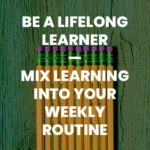Table of Contents
“I feel lost.”
Ever uttered those three words?
Do you feel like you wasted a bunch of time trying to live your life the way others want you to live?
This happens to many people and they find themselves feeling “lost.”
They lack passion in their lives, but they don’t know what they could be passionate about. Some people succumb to these feelings of being lost and stuck—even to the point of losing all hope that things will be different one day.
This feeling is particularly common among young adults, who find themselves on their own for the first time and unsure where to go next. This can lead to a quarter-life crisis if they get stuck for too long.
If the “definition of insanity is doing the same thing over and over again, but expecting different results,” as Einstein claimed, then you know what you need to do:
Something different.
A select few people make this important realization and begin a personal development journey to find out what to do with their lives.
There are tons of clues in your life to guide you if you can learn how to spot them. Let’s look at some strategies that can help.
“Why do I feel lost?” Here’s the real answer
As a personal development writer, I meet a lot of people who say they are feeling lost. They know they want to do something different with their life, but they can’t quite put their finger on it. I ask them the same question every single time.
What would you do if you had all the resources in the world and you knew your plan would work out?
All of a sudden, they have a sudden burst of clarity and know exactly what they would do. I’ve had people tell me they want to start a pet grooming store, become a self-employed consultant in the field they work in, start a health and wellness company—all sorts of answers.
They know what they want, but they just don’t have the confidence to pull it off.
What they call lack of clarity is really just fear and self-doubt. What does this mean for you? On some level, you already know what to do with your life, but you don’t believe it’s possible.
If you’re struggling to figure out why you’re feeling lost, try asking yourself the same question.
What would you do if fear was removed from the equation? What would you do if you didn’t have to worry about judgment from other people about your life and career choices?
Even if you don’t know the exact answer, you probably have an idea of the direction. But without believing in yourself and thinking you can get what you want, it’s hard to take even the first step.
What to do when you are feeling lost
There’s no magic recipe or answer on how to combat your fears. You can either let fear run your life or understand that you don’t have a ton to lose if you just go for it.
Even if you spend time, money, and effort on something that doesn’t pan out, you’ll feel better about at least making an attempt. With that understanding in mind, let’s look at some practical tips to help you figure out what to do with your life.
Phase 1: Become a learning machine and research your options

At a time when I felt stuck and lost, I started looking for answers and trying to get smarter. In the first year of my new journey, I read a ton of books, watched videos online, listened to podcasts, etc. This helped me improve my overall disposition and level of confidence and it gave me insights that I used to navigate life.
Charlie Munger has a great quote about the power of learning:
I constantly see people rise in life who are not the smartest, sometimes not even the most diligent, but they are learning machines. They go to bed every night a little wiser than they were when they got up and boy does that help, particularly when you have a long run ahead of you.
If you want to turn yourself into a learning machine, we have an couple articles that can help you do just that:
On top of learning, you can use a few strategies to help narrow down what you might want to do with your life:
Personality tests
There’s a hot debate on whether or not personality tests are scientifically accurate, but the science behind them doesn’t matter as much as having clues and hints you can use to take action. These tests usually come with recommendations for careers or steps you can take to develop your strengths. My favorites are Strengths Finder, Meyers Briggs, and the Big Five Personality Test.
Feedback from people you know
You’ve probably had a friend, acquaintance, teacher, or family member tell you that you’d be really good at a specific career or that you have a particular talent. Listen to them. I got started with writing because a friend noticed my Facebook posts and asked me to write articles for his website. There’s no harm in asking a few people you trust to say what they think your strengths are. Your friends, parents, and teachers may all have insights that surprise you.
The “It’d be cool test”
Use the phrase, “It’d be cool to…” and fill in the blank with something you’ve always thought about trying or saw someone else do successfully. This is similar to the question I asked at the top of this article, but phrasing it like this can unlock new ideas.
The bookstore test
I learned this one from James Altucher. He says to find a section in a bookstore where you’d want to read every single book in it. I leaned toward books about business, psychology, and entrepreneurship, which are the topics I write about now.
Use your past to your advantage
You’ve already developed skills from the jobs and life experiences you’ve had. Often, it could be as simple as turning your current job into a business—for example, selling your web design services instead of doing it as an employee.
After this period of research, you have to pick something you want to try. You could decide you want to start a new business. Maybe you want to switch careers. Perhaps you’re just looking to revamp your life as a whole through self-improvement. Wherever you land, give your new idea a trial run and actually follow through with it.
Phase 2: The experimental phase

I didn’t become a full-time writer overnight. I started by writing a single article. Then I wrote another one. After about 90 days or so, I realized it was something I wanted to take a serious stab at doing. Along with working on my writing, I had a few supporting habits that helped me during this trial phase—reading, journaling, and taking personal development programs online.
During this experimental phase, start by testing the skills you have or want to develop.
I usually recommend 90 days because that’s enough time to give a sincere effort, but not so much time that you’ll feel locked in. You’re “dating” your new path. You don’t have to get married to it. The goal is to make consistent action toward figuring out whether or not this new path is something you want to commit to long-term.
You want to spend every day, or at least every weekday, doing something that lends to the experiment. If it’s something straightforward like learning how to write, your process might include activities like writing articles, researching tips on building an audience with your blog, and getting your blog set up.
Say you want to start a business but don’t know exactly what business you want to start. You might develop a strategy like this:
Days 1-30
- Make a list of all possible business ideas
- Select top 5 business ideas
- Research one business idea a day for a week
- Choose top 2 business ideas
- Reach out to 10 people already running these businesses and ask questions
Days 31 – 60
- Select final business idea
- Buy a domain and build a website
- Rewrite your LinkedIn profile
- Attend 3 networking events for your industry
- Create processes for pricing and quoting
Days 61 – 90
- Win your first client (or sell your first products)
- Map out your potential earnings for the year
- Decide what further marketing you need to do
- Reassess whether this is the right plan for you
You also want to commit those 90 days to have a personal development routine that keeps you motivated. This should be a period in your life where you’re just looking to level up, period. Hit the gym, read some books, watch an inspiring video every morning, whatever you have to do to keep your mindset and energy high.
After 90 days, if you really push yourself, you’ll have a good idea of whether you want to stick with the path or not. You should judge the success of your experiment by whether or not you enjoyed and got invested in the process, not how amazing your results were.
Ninety days isn’t enough time to build a brand new life from scratch. It’s just enough to give you a clue.
Phase 3: The full transformation

If you make it past 90 days and you’re enjoying these new habits, it’s time to work towards reinventing yourself for good. For me, I went from trying out writing as an experiment to realizing I really wanted to pursue it as a career after about a year. If you can stick with something for a year, you’re far ahead of the pack.
Here’s what you have to understand about building a new life path from something you try on the side. If you stick with it, you’ll experience exponential growth in the long run. At first, you won’t see a ton of rewards for your efforts. But, as time passes, you’ll get dramatically better results with the same level of effort. You need to give yourself time to learn the nuances of your new path—the skills and micro-skills you need to be successful.
As you grow more competent, you’ll grow more passionate. Don’t make the mistake of thinking you need massive levels of passion to get started. Skills and tasks that used to be difficult to learn will become second nature to you. Building effective habits and routines starts as a struggle and then becomes an automatic process.
Most of the heavy lifting happens in the very beginning.
It’s also when most people quit. If you can embrace the fact that you’re going to struggle early on (and that it’s unavoidable), you’ll put yourself in a position to succeed later. I struggled to get any eyeballs on my articles at first. Fast forward five years and I have millions of readers. The only difference between me and the writers who fail?
I never stopped.
If you put yourself in motion and constantly learn from your experiences, your path will reveal itself to you. Robert Greene did an amazing TED talk on finding your passion and the main theme was simple: Don’t sit around and wait for this new life of yours to fall in your lap. It won’t happen. Understand that all of your life experiences are clues—and then use them.
Once you decide to make the effort for the sake of the effort, the easier it will be to break away from “I feel lost” and confidently say, “THIS is what I want to do with my life.”




